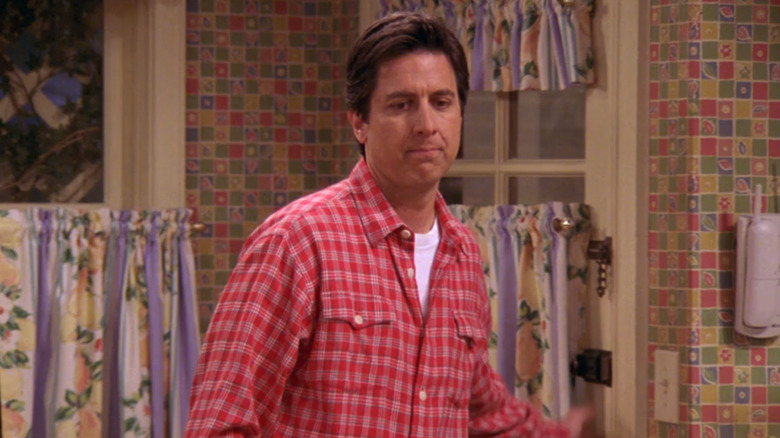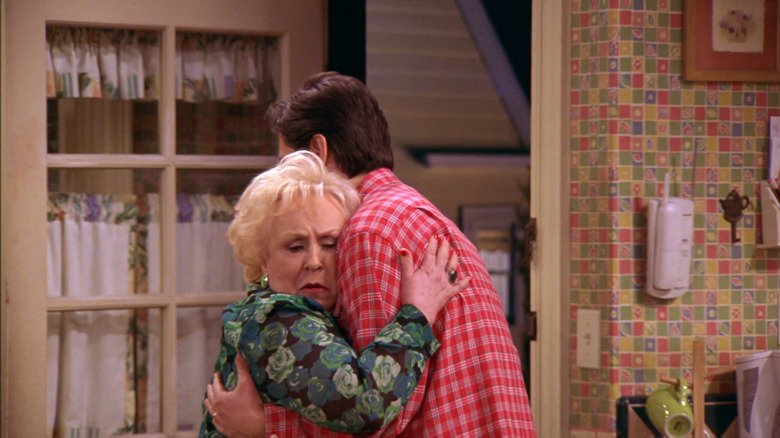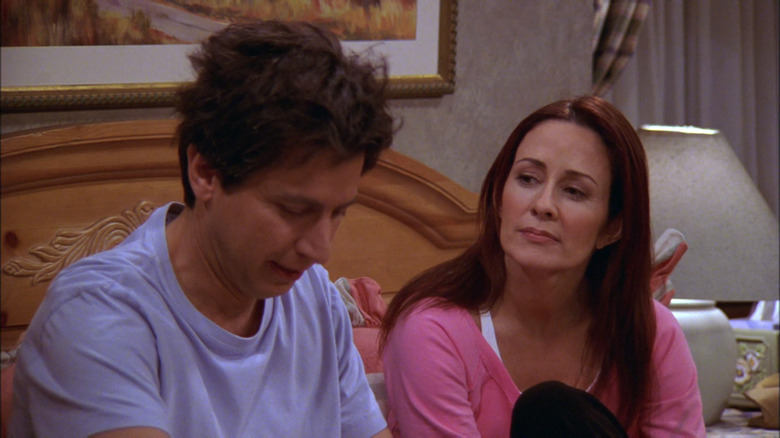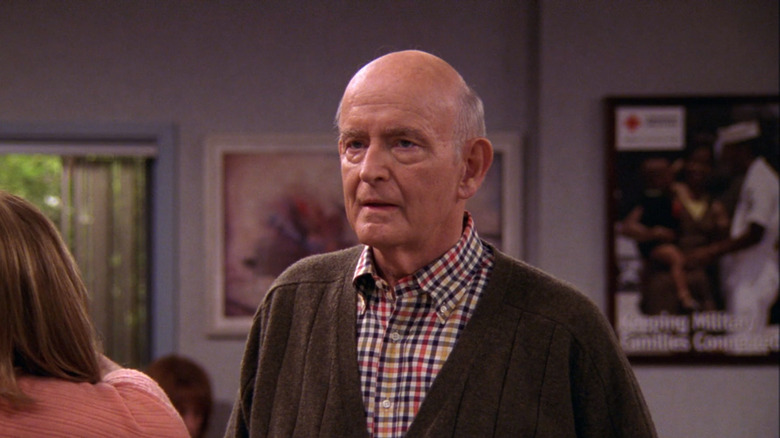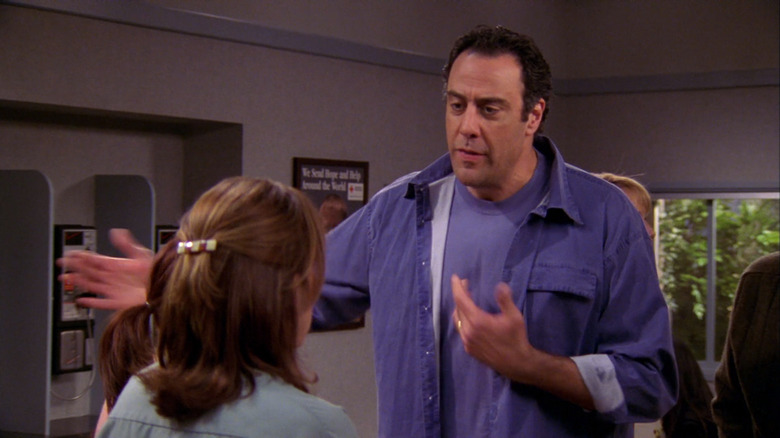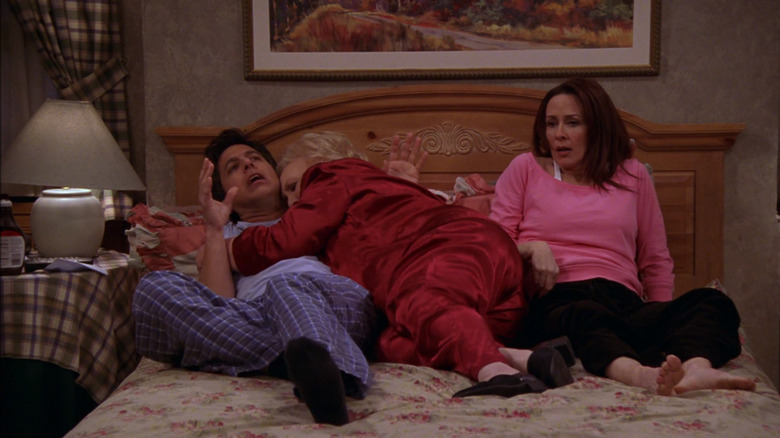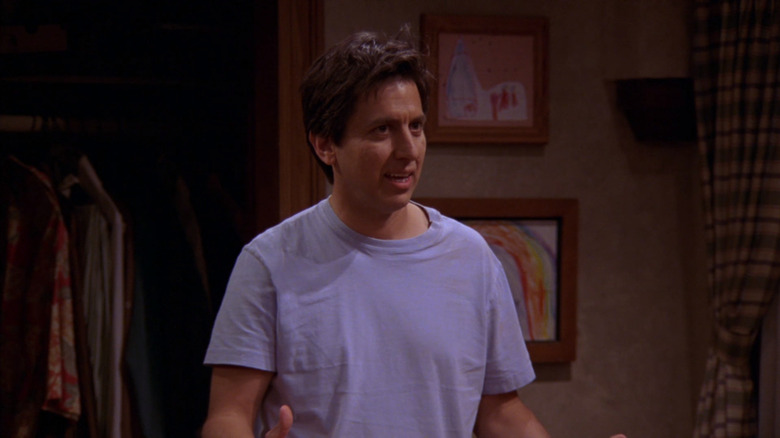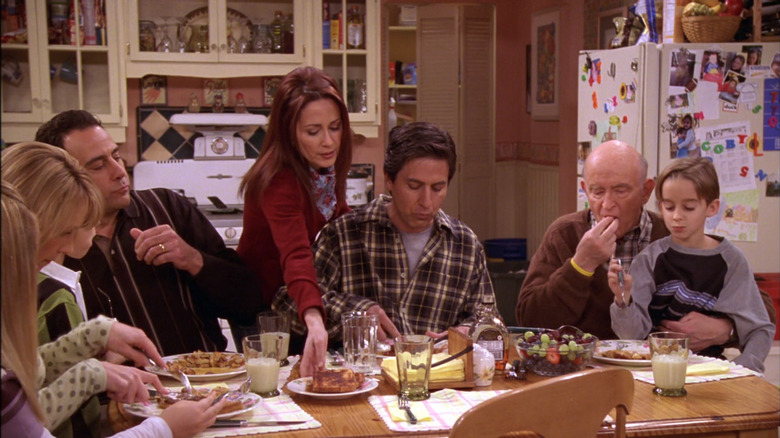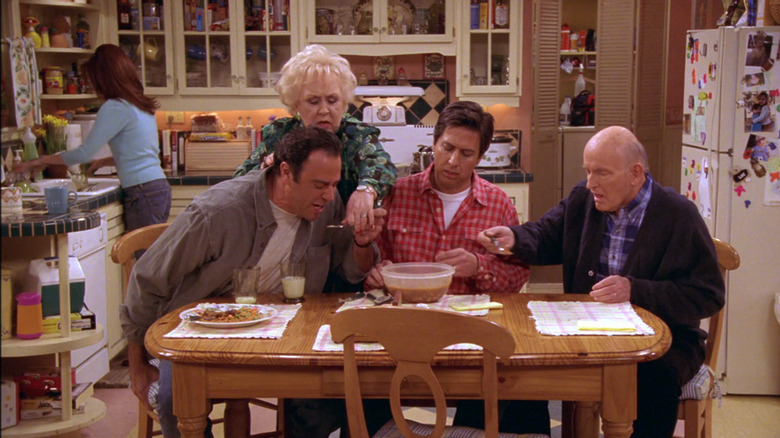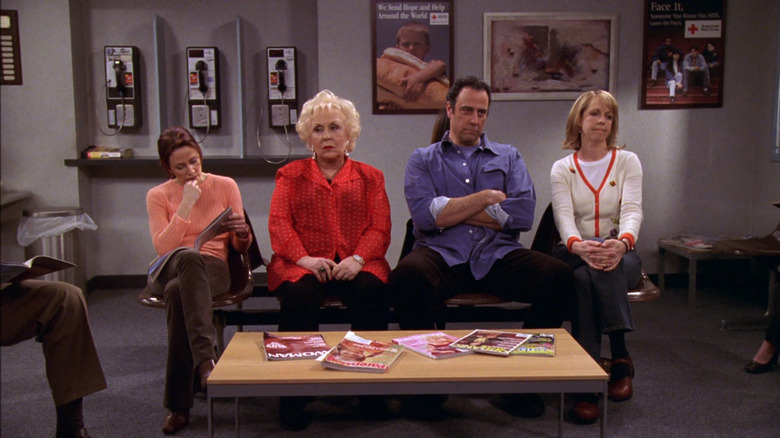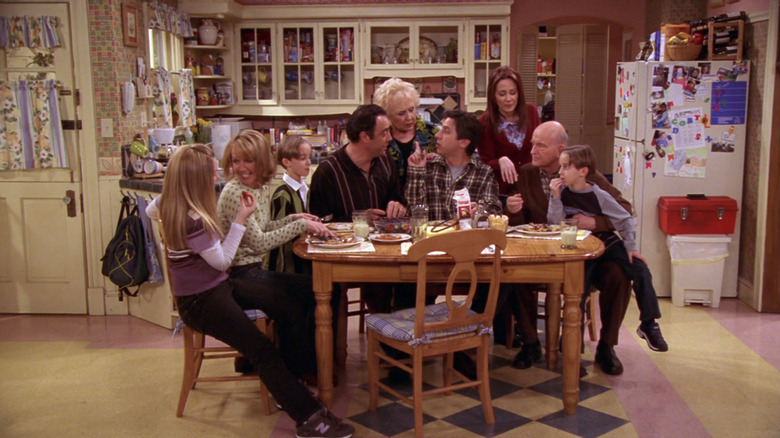The Ending Of Everybody Loves Raymond Finally Explained
In 2005, one of the most popular sitcoms of all time went off the air with a poignant yet deliberately open-ended series finale. "Everybody Loves Raymond," based on the comedy of Ray Romano and starring Romano as sportswriter and family man Ray Barone, ran for nine top-rated seasons on CBS and became a staple of American television over the course of nearly a decade and more than 200 episodes. When it finally came time to end the show, an entire nation tuned in to see how the Barones would say goodbye.
In the years since it went off the air, "Raymond" has only risen in esteem as one of TV's greatest sitcoms, earning consistently high praise on TV best-of lists and cementing its place as a classic through years of frequently watched reruns on various cable and broadcast stations. But how did "Raymond" arrive at its somewhat low-key finale, why did the writers choose to go out that way, and how does it reflect on each character's journey? Let's dig deeper into the series finale of "Everybody Loves Raymond."
A health scare
The "Everybody Loves Raymond" series finale, titled simply "The Finale," begins with a scenario that showrunner Phil Rosenthal described in an interview with the Television Academy Foundation as deeply "relatable." It's something just about everyone among the millions watching that night in 2005 could grasp and tie back to an event in their own lives — an unexpected health scare.
The episode launches with Ray revealing that he has to have an operation to get his adenoids removed after years of sore throats and trouble swallowing. It's a minor procedure, but he's still convinced it will go terribly and could kill him, so he drags the whole family along to the hospital. While they're there, a nurse comes out and explains that Ray isn't waking up from the anesthesia. The whole Barone family freaks out. Less than a minute later, a doctor appears and tells them that Ray is going to be fine, is coming out of the anesthesia and will be available to visit in just a few minutes.
Again, it's a small but relatable moment that Rosenthal crafted to hook the audience in, because the health scare isn't actually the linchpin of the story. It's what happens next that changes the dynamic of the entire Barone family, and sends the show off with a big emotional punch.
Debra's reaction
When she hears that her husband might not wake up after what was supposed to be a simple medical procedure, Debra Barone (Patricia Heaton) understandably breaks down crying, terrified for a few moments that her husband and partner might die. The moment passes quickly, but her father-in-law Frank (Peter Boyle) and brother-in-law Robert (Brad Garrett) both see the impact it has on her. They're also there to hear her next words — a vow that none of them can ever tell Ray what just happened, for fear of how he'd react.
Once Ray is back home, Debra starts to look at her home life quite differently, even when she's complaining to Ray that he can't do simple chores like picking up the dry cleaning without making a mistake. Suddenly, she's much more grateful to have her husband in her life, and it's clear from their interactions in the finale that she's still imagining what life would be like without him. Even with that changed outlook, though, Debra steadfastly refuses to disclose to Ray what made her so suddenly grateful that he's there eating ice cream and making a mess in their bed as he recovers from surgery. That mistake is left to another member of the Barone family.
Frank's reaction
Frank Barone is not one for showing emotion. Throughout the original run of "Everybody Loves Raymond" he's depicted as a crude, sarcastic patriarch who only shows real affection and earnest love when the situation is really dire. But it's clear right away that the prospect of losing his son weighs heavily on Frank's mind.
In the aftermath of the surgery, Frank agrees to keep what happened secret from Ray, and further vows to never tell his own wife, Marie, about the near-death experience, as she was luckily in the bathroom when it all went down. But Frank can't let go of what he felt when he briefly thought Ray might die. Later in the episode, he remarks that he had never seen Debra break down like that before and he never wants to see it again. It gnaws at him, and because Marie is an ever-vigilant matriarch, she notices.
So, Frank breaks the code of silence and tells his wife what happened — a decision that will have far-reaching ramifications for the rest of the episode. More than that, though, it underlines just how emotional Frank really is, even when he's not prepared to show it. He quite literally loves his family more than he can say.
Robert's reaction
Perhaps the longest-running theme in the entire show is the inferiority complex nursed by Robert Barone. Because he's the oldest and Raymond is his baby brother, Robert has come into adulthood feeling like Ray gets all the special treatment from their parents and all the best breaks in life. It's a feeling that's re-emphasized throughout the series by Robert's seemingly constant bad luck, including injuries during his work as a police officer, problems he gets blamed for instead of Ray, and of course, his unlucky love life.
So, when Raymond goes in for a minor operation and asks the whole family to accompany him, Robert is predictably grumpy about the whole thing, even joking that he's only there because he and Ray have the same blood type. When the doctors tell him that Ray isn't waking up, though, Robert immediately leaps into action, shouting Ray's name and claiming that he's his brother and is therefore the one who can wake him up. When the chaos dies down, Robert seemingly goes back to his old self, but his wife Amy (Monica Horan) later reveals that Robert pulled the car over and broke down crying on his way home from the hospital. He tries to play it off as no big deal but coming that close to losing his brother makes a real impact on Robert. It feels like the resentment that's been quietly hanging over the whole show for years might be crumbling just a bit.
Marie's reaction
When the Barone family gets the news of Ray's scare, Marie is off in the bathroom, so Frank, Robert, and Debra make a pact to never tell her. But as has been the case for the entire run of the series, Marie ultimately gets to the bottom of things. She notices Frank's melancholy nature and decides she's going to mention it, which prompts Frank's confession.
This, naturally, sends Marie into hysterics. She rushes across the street to Ray and Debra's house, barges into the bedroom, and throws herself on her youngest son while everyone in the room looks on horrified. Ray jokes that his worst nightmare is coming true, underlining the Oedipal weirdness of Marie's fixation on her son, but it's not just about the laughs. Marie is genuinely overwhelmed by the news that she almost lost one of her boys and is overjoyed that she didn't. Plus, it's her reaction that sets up the major turning point that comes immediately after she storms into Ray's bedroom.
Ray's reaction
Once Marie finds out that Ray almost died, it's only a matter of time before Ray himself finds out, and a matter of seconds after getting his mother out of his bed, he learns the truth. His wife, brother, and father confess that they kept a secret from him, and Ray is momentarily shocked ... until he's amused. He asks, "What did everybody do?" as a way to pry adoration out of his family and he has a little fun ribbing everyone. That's when Frank steps in.
Full of emotion as he relives the memory of Ray's health scare, Frank shouts at Ray about how Debra reacted, and makes it clear that they all took the health scare very seriously, while Ray doesn't seem to be taking it seriously at all. In the aftermath of his father's comments, Ray seems to change his tune. He tells Debra he loves her, in his own strange way, and gets much more contemplative about what his life and his family mean to him, even if he's not entirely willing to express it. It's that contemplation that eventually leads to the finale's closing moment.
A bigger table
Early in the "Everybody Loves Raymond" series finale, the Barones are having dinner when Frank and Robert barge in and begin eating while Ray and his children are trying to share a meal. Ray complains that it's getting crowded in his kitchen, to which Robert responds that he needs a bigger table. It's a moment that could have happened at any point during any episode of the show — a typical expression of Ray's grumpiness at the intrusiveness of his family.
In the final scene, after Ray has gone through a surgery, a health scare, and the revelation that his family genuinely got emotional when they thought they might lose him, a similar scenario plays out. Ray sits down for breakfast, and within minutes his father, mother, brother, and sister-in-law have all crowded into the kitchen to eat with the Barones. This time it's Debra who proclaims it's crowded, to which Ray responds, "We need a bigger table."
After nine years of stories about family intrusion, Ray has at last learned that it's the chaos of his family who makes him who he is and makes his family who they are. The intrusion is love, and the love is manifested through constant hovering and attention and, yes, annoyance and sniping. We don't get to see what happens after that, but it's clear that after all this time, Ray has finally grown as a family man.
The birth of the finale
According to "Everybody Loves Raymond" creator Phil Rosenthal, the idea for a health scare setting off a round of contemplation throughout the entire Barone family came to him well before the episode actually aired in the spring of 2005. Speaking to the Television Academy Foundation, Rosenthal revealed that he came up with the story midway through the writing of Season 8 of the show and intended it to be the series finale when the eighth season wrapped up.
The problem was that CBS and various other interested parties really wanted "Raymond" to return for a ninth season, which meant Rosenthal couldn't use his finale idea right away. Reluctant to go another year, he and the show's writers nevertheless put their heads together and came up with enough stories to justify a Season 9. The writers eventually concocted 12 episodes. The network countered with an offer of 18, and Rosenthal eventually met them in the middle at 16 episodes. With that plan in place, the network also wanted to "eventize" the finale by stretching the story to one hour. Rosenthal countered that his TV touchstone, "The Mary Tyler Moore Show," ends on a half hour, and therefore "Raymond" would as well. They compromised by producing a one-hour documentary special which aired before the actual finale in May of 2005.
Keeping the secret
With Rosenthal and CBS both on board for a ninth and final season of 16 episodes, Rosenthal and his writing staff had to put the plan in motion for how to conclude the series. It began with a bit of a change to the lineup of Season 8, which Rosenthal and company originally thought would be the final season. Because the network wanted a ninth season, and also wanted a larger order of episodes for that season than Rosenthal originally intended, the showrunner told CBS that Season 8's 24-episode order would be reduced to 23. With his planned finale now moved back an entire season, Rosenthal decided that Season 8 should instead conclude with "Golf for It" — an episode in which Ray and Robert battle over which one of them will take care of their mother after their father dies.
With that plan in place, Rosenthal had to keep his finale idea under wraps until the last possible moment. He discussed the story with the show's writers, and with Romano, to make sure everyone was on board, but he told the Television Academy Foundation that no one else could know for a very specific reason.
"They know he's not going to die if it's not the finale, that's why we could not tell anybody what this was. I couldn't give this away. I want the audience to be scared to death."
Leave them in the middle
In crafting the "Everybody Loves Raymond" series finale, Phil Rosenthal looked back on many of his other favorite series finales throughout the history of television and came back with a crucial conclusion about his own storytelling. He did not want to "tear the house down," he told the Television Academy Foundation, referring to numerous other sitcoms which end with someone moving away, or leaving their job, or breaking up a friend group for the sake of finality. "Raymond," he decided, would not end like that.
"We came into their lives in the middle," Rosenthal said. "What if we left in the middle?"
So, working from that premise, Rosenthal, Romano, and company specifically designed the series finale to be a story in which we don't see any real finality in the lives of the Barones. We simply leave them at the breakfast table together and allow them to keep going — something underlined by the show's presence as a top-rated syndicated series. For Rosenthal, it boils down to a simple idea — families don't end.
"We go away, but they're there," he said. "And by the way, you're going to see them in syndication anyway. It doesn't have to end."
